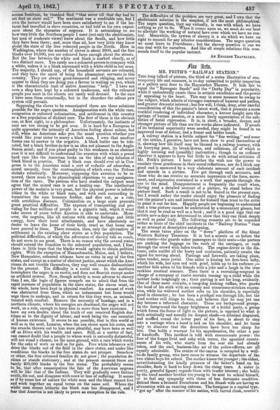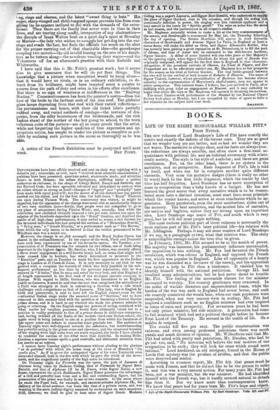firm rto.
MR. FRITH'S "RAILWAY STATION."
This long talked of picture, the third of a series illustrative of con- temporary life and manners, is to-day submitted to public inspection at a gallery next door to the Haymarket Theatre. It bids fair to, equal the "Ramsgate Sands" and the "Derby Day" in popularity, while it undoubtedly excels them in artistic excellence and the power of appealing to the heart. This may in some measure be owing to the subject, which admits of stronger contrasts of humour and pathos, and greater dramatic interest; but few will, I think, deny, after careful consideration of this the painter's latest work, that it presents a more truthful rendering of individual character, a keener insight into the springs of human passion, or a more lively appreciation of the sub- tleties of facial expression. It is, in short, a broader, deeper, and stronger picture of lifethan are the works above indicated. If proofs of its technical superiority were needed, they might be found in an improved tone of colour, and a firmer and bolder touch. A railway station is a fertile subject for "fine writing," and some of the critics, I perceive, have not been slow to avail themselves .of it, showing how -life itself may be likened to a railway journey, with its hurrying pace, its break-downs, and collisions, all of which is highly amusing and (possibly) instructive; though to an ordinary observer it appears to have but little to do with actual criticism of Mr. Frith's picture. I have neither the wish nor the power to emulate these gentlemen in their moral reflections, nor do I think any good end is answered by a very elaborate account of each incident and episode in a picture. Few get through such accounts, and those who do can receive no accurate impression of the form, move- ment, and expression contained in a work that appeals through the eye to the mind. Disappointment is frequently the result when, having read a detailed account of a picture, we stand before the picture itself. Such a result is not to be feared in the present case, but I would rather the reader should enjoy the pleasure of finding out the painter's aim and intention for himself than trust to the critic to point it out for him. Happily people are beginning to understand that a true picture cannot be understood by a momentary glance, but that it may be read as well as a book; and it is a good sign that our artists now-a-days are determined to show that they can think deeply as well as paint truly. The following remarks are to be regarded rather as hints of the chief incidents in the "Railway Station" than as an attempt at descriptive cataloguing. The scene takes place on the "down" platform of the Great Western Railway Terminus. It is but a minute or so before the train starts—the guards usher passengers to their seats—the porters are packing the luggage on the roofs of the carriages, or rush through the crowd with laden trucks. The engine-driver in the dis- tance, calm amidst all the hurry and confusion, patiently awaits the signal for moving ahead. Partings and farewells are taking place, some tender, some jovial. One sailor is kissing his first-born baby, which his wife, her eyes red with grief, holds up to his embrace ;— another bids adieu to his friends with a joke and a laugh in the true reckless nautical manner. Then there is a recruiting-sergeant in charge of a company of rustic recruits tossing up a child while the mother looks laughingly on ; their parting is not for long, evidently. One of these same recruits, a hang-dog looking ruffian, who gnaws the head of his stick with an uneasy and conscience-stricken expres- sion, while his widowed mother sobs on his shoulder, is especially good in character ; he has been a prodigal son through life, but the fond mother still clings to him, and believes that he may yet one day become a reformed character. These are background groups. In the foreground the happy brightness of a bridal party, a group which forms the focus of light in the picture, is opposed to what is both artistically and morally its deepest shade—a criminal disguised, and muffled round the lower part of his face, is about to step into a carriage when a hand is laid on his shoulder, and he turns only to discover that the detectives have been too sharp for him. One holds a warrant for his apprehension, the other a pair of handcuffs. This incident is told with consummate power : the face of the forger livid and ashy with terror, the agonised counte- nance of his wife, who starts from the seat she had already taken, and the cool, business-like air of the police-officers, are all equally admirable. The centre of the canvas is occupied by a well- to-do family group, who have come to witness the departure of the two eldest boys for school. The mother kisses the younger ; the eldest, notwithstanding the kindly pressure of the father's hand on his shoulder, finds it hard to keep down the rising tears. A sister ca. pretty, graceful figure) regards them with tender interest ; she holes by the hand another brother too young to be sent to school himself, or to feel any sympathy with those of less fortunate condition. Behind these a bronzed Frenchman and his blonde wife are having an altercation with an exacting cabman. The foreigner is a capital type, "got up" after the manner of his nation, with furred cloak, courier's lag, rings and charms, and the latest "sweet thing in hats." His eager, sharp-visaged and shrill-tongued spouse prevents him from com- plying (as he appears inclined to do) with the demands of the extor- tioner. Then there are the family that never were in time in their lives, and are tearing along madly, irrespective of any obstruction— the disciple of Izaalc Walton bent on a quiet day's sport at Streatley or Marlow—the lady who wishes to smuggle her pet dog into the car- riage and evade the fare, but finds the officials too much on the alert for the proper carrying out of that charitable idea—the gamekeeper coupling two setters—the old invalid leaning on the arm of his daugh- ters as he totters along—the newsboys vending their wares—and the Volunteers off for an afternoon's practice with their Enfields and Whitworths.
I have said that this is Mr. Frith's greatest work; but it seems also to give assurance that he will do yet finer things. The knowledge that a picture when completed would be hung alone— that it would have no rivals, as in an ordinary exhibition, to de- tract front its brilliancy, might have tempted many a painter to swerve from the path of duty and relax in his efforts after excellence. But there is no sign of weariness or indifference in the "Railway Station." Conscientiousness has been the painter's motto—from the face of the bride to the farthest arch of the iron roof. The globular glass lamps depending from that roof with their varied reflections— the portmanteaus and boxes, with their old ticket labels partially rubbed away, and varied methods of cordage—the textures of dra- peries, from the silky bournouses of the bridesmaids, and the rich Indian shawl of the mother of the boy going to school, to the worn velveteen suits of the porters—are all so many proofs that the artist, while not forgetting the higher qualities of true expression and ap- propriate action, has sought to render his picture as complete as pos- sible by realizing each picture in the scene as thoroughly as he was able.
A notice of the French Exhibition must be postponed until next
week. DRY POINT.































 Previous page
Previous page